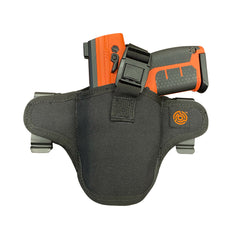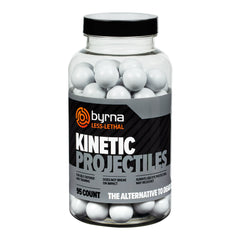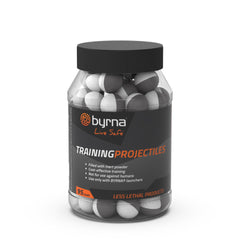
People are curious about less-lethal options - especially because they're sometimes used by the police. These rubber bullets are made to stop someone without killing them - it gives a safer option compared to regular guns. But are they really a fitting choice for defending your home? That's a big question!
We should look into how useful, safe, and helpful they are in these situations. Knowing their benefits and limits will help you decide on your home security needs. Let's just jump in and study this topic together!
Table of Contents
What Are Rubber Bullets?
Rubber bullets made from parts like rubber, plastic, metal, or foam are built to stop someone without causing death - they were first used for riot control and crowd dispersal by the British military in the 1970s. You've probably seen them used during intense crowd-control situations!
Rubber bullets are designed to be less lethal. This could make you think they're safer, but that's just one side of the story. Sometimes, they have a metal core covered in a polymer coating, or they could be made of plastic or hardened foam. They are made to hurt without breaking the skin. However, their odd shape and slower speed can make their effectiveness unpredictable. Imagine an unpredictable pitch in baseball - it sometimes hits the mark, and other times it goes wild.

There are benefits to rubber bullets, such as being less lethal than regular ammo.
You could see them used for short-range target practice or even some recreational activities. But don't get too comfortable around them - they are designed to be less deadly, but they can still cause serious injuries. I mean blindness, broken bones, or even death - especially up close. A study in 2017 found that 3% of people hit by rubber bullets died, and 15% suffered permanent injuries. They are no joke - these are powerful self defense tools.
Doctors with Physicians for Human Rights have spoken out against gunpowder-based rubber bullets in crowd control because they are inaccurate and can hurt people - with rubber bullets, you don't always hit what you shoot for. You wouldn't want to accidentally hurt a family member or neighbor.
Now, it's important to make a distinction between gunpowder-based rubber bullets fired out of firearms versus the ones Byrna's CO2 launchers. These CO2 launchers work very similarly, but they are not quite as likely to cause death or permanent injuries as the study above because the rounds aren't powered by gunpowder. The size, feet per second, and delivery method are completely different.
But remember that gunpowder-based rubber bullets are still bullets - and the rounds that are fired from Byrna launchers are not. This is an important difference when you consider run-ins with law inforcemement, too, as well as concealed carry, travel, keeping these in your car, self defense usage, legal cases, and so on. There are very strict rules surrounding firearms in many states, but those same laws don't usually exist for CO2 launchers.
Either way, don't be fooled - both types of rubber projectiles are serious non-lethal options that will hurt immensely if you're hit by one.
Next, let's talk about home defense next and the efficacy of these rounds.
How Effective Are Rubber Bullets?
Rubber bullets are made to stop an intruder without causing deadly injuries. How helpful they are can depend on things like the type of projectile, the size of the bullet, and the gun's power.
You might find that projectiles with a steel core or mixed with steel powder are sometimes preferable - they pack more weight and hardness - and they give stronger results when it counts! But they are also more likely to be lethal.
When you compare rubber bullets to other less-lethal options like stun guns or pepper spray, one big point comes up: stun guns and pepper spray don't need perfect aim to be effective. That's a big plus in a high-stress second when your adrenaline is surging! Accuracy is important because missing means you fail to stop the threat - that's a risk you really don't want to take.
You could also run into problems with malfunctions. Rubber bullets could deliver a strong blow, but they can also really hurt or even kill at close range - especially if you're using gunpowder-based rounds, instead of Byrna's launchers. So you have to ask: Is reliability your biggest worry when stress is high and time is short? Some experts argue that rubber bullets aren't steady enough in these high-stress moments. You don't want your last line of defense to be unpredictable.

Looking at real-world examples can make things more obvious. In home defense, how well rubber bullets work depends on the specific situation and how skilled you are. It's different from how law enforcement uses them for crowd control - they're helpful in those cases, but home defense situations are different. The stakes are much higher at home.
You won't find statistics on rubber bullets in real-life situations, but the studies out there show they can cause serious harm or death - especially up close. That brings up legal issues. Rubber bullets for home defense can put you under the same legal scrutiny as lethal ammo. That's not just a bit of a loophole.
All these points make rubber bullets a mixed option for home defense. They could stop an intruder, but the dangers and reliability issues can sometimes outweigh the upside. Alternatives like stun guns or pepper spray could give you more reliable protection without needing perfect aim.
Legal Issues and Concerns
Rubber bullets for home defense? That's a tough topic. Laws vary at local, state, and federal levels. So before you do anything, check out what's legal in your area. From my experience, states treat "less lethal" ammo, like rubber bullets, almost the same as live rounds. That means you need to really believe you have to face an imminent threat of death or serious injury to justify their use. It really makes you think, doesn't it?
Some states have "castle doctrine" or "stand your ground" laws. These could change how justified you are in using rubber bullets. But - remember that these laws are open to interpretation and might not give you the full freedom you expect. You could need a strong legal defense for a decision you thought was simple.
Federal laws don't make things much clearer either - even though less-lethal ammo isn't specifically regulated for home defense, the National Institute of Justice suggests that you should also be ready with lethal backup. That means that rubber bullets alone could not be seen as enough by law. So you might need a Plan B.

Potential criminal charges are another thing to think about. Court cases can vary quite a bit based on specific details. Your safest bet? Make sure every action you take is justified.
Civil liability is also a worry - even if you stay away from criminal charges, the injured party could sue you! This could cost you quite a bit financially and legally. That's a pretty sobering thought, right?
Recent legal cases have shown mixed outcomes. Some courts see less-lethal ammo as a mitigating factor, but there's no guarantee. From what I've seen, legal interpretations can be quite unpredictable.
Laws can be a real minefield when it comes to rubber bullets. It's important for you to completely understand them to stay away from messy legal consequences. Be in sync to protect yourself legally.
Possible Risks and Dangers
Rubber bullets could feel like a safer option for home defense, but they come with dangers. Even though they are called less lethal, rubber bullets can cause extreme injuries. Fractures, eye injuries, brain injuries, and organ damage are pretty familiar. You could hit an intruder and end up causing internal bleeding or permanent nerve damage - so they're not as harmless as the name "rubber bullet" suggests!

Think about the dangers of using them wrong, too. Accidental misfires are a big concern - especially if you have kids around. The idea of a rubber bullet bouncing off a wall and hitting someone else should make you think twice. Also, these bullets might not have enough stopping power - that means you could find yourself in a prolonged and more dangerous situation with the intruder. Prolonged run-ins aren't optimal in high-stress scenarios.
Studies back up these issues. Research shows that rubber bullets can cause serious injuries, disabilities, and even death. The American Civil Liberties Union (ACLU) found that 70% of people injured by rubber bullets need medical treatment. Take a bit to think about those numbers. That's not a small issue - it's a big health danger. Protesters with fractured facial bones or lost eyes (these are bystanders in conflict zones), not even in high-crime areas where you could expect rubber bullets to be used.
With all these dangers, you need to weigh the risks. Sure, rubber bullets seem like a less-lethal choice, but are they really safer? They can still go through walls, hurting friends or family in nearby rooms. Their ability to stop a determined or intoxicated intruder is also doubtful. If the threat is serious enough to need a gun for home defense - does picking a less-lethal option like rubber bullets mean you didn't feel your life was really in danger?
Legal issues also come into play. Depending on where you live, rubber bullets could put you in a legal gray area. Some argue it could be seen as not taking the threat seriously enough, which could cause legal trouble. Laws vary, and what's allowed in one place could be a big problem in another. The uncertainty can be stressful and burdensome - especially when you're already dealing with the aftermath of a home incident.
Think about all these factors before deciding if rubber bullets are the right choice for your home defense plan!
What Are The Alternatives?
Rubber bullets for home defense? It's a pretty hot topic. You might think they're a good idea because they're seen as less-lethal and could lower legal dangers. Maybe you believe they cause enough pain to stop an attacker. But rubber bullets can still cause serious injury or even death - especially up close. Also, they might not work on someone high on drugs. You can't always trust them to stop an attacker.
Now, let's compare them to other home defense options. Take pepper spray just to give you an example. It's safer and less lethal than rubber bullets and could stop an attacker. But its effectiveness can vary - especially with multiple attackers. Besides, it could affect innocent people nearby.

What about stun guns? They can stop an attacker without causing long-term harm and are safer than guns. However, they could fail if the attacker wears thick clothes or if there is more than one intruder.
Traditional firearms are helpful at stopping an attacker - people who feel a strong need for self-defense might like them. But they come with serious dangers like injury or death - and heavy legal consequences.
Think about security systems. They can warn you early about potential threats and could scare off intruders. But they don't give you immediate physical protection - and can be expensive to install and keep up.
Expert opinions weigh in heavily here! Experts sometimes call rubber bullets the "worst-of-all-worlds" option - they can be lethal and unreliable. Some say if you need lethal force, traditional firearms are better. Studies show that less-lethal munitions work best when used by trained people wearing body armor and backed up by lethal force. Law enforcement uses rubber bullets for crowd control, but they aren't recommended for home defense.
There's also special equipment like the Bolawrap, which is an eight-foot Kevlar tether device that can immobilize attackers. Or less-lethal launchers like the Byrna SD. These devices give you less-lethal ways to incapacitate someone without fatal outcomes.
You need to think about what works for you - there's no one-size-fits-all answer. Your living situation, family setup, and comfort with different methods should influence your choice.
Is Home Safety Worth The Risk?
You really need tools that you can count on - that work well when picking out self-defense gear. What we've looked at shows how difficult and maybe flawed some less-lethal options can be. This makes us really think about what has the best protection for our homes and family.
Regarding reliable self-defense tools, Byrna Technologies is a big name in less-lethal defense products.
Picture having peace of mind knowing you have reliable protection without needing a gun. Our special pull-pierce CO2 cartridge system means our devices are ready to go in a pinch. You could find it interesting that Byrna products are legal in all 50 states! You don't need a background check, and these can be shipped straight to your door. It's easy and hassle-free.

We also have different tools for different needs. Whether you like pistols, rifles, projectiles, pepper sprays, sirens, or even Ballistipac backpacks, Byrna has something for you. It's comforting to know that you can carry these in checked luggage without CO2 cartridges, which makes it easier for travelers. Thousands of users nationwide have given five-star reviews showing Byrna's dedication to safety and customer happiness.
Given the options and the need for reliable self-defense choices, checking out Byrna.com could be a good next move! Find why so many people trust Byrna for their security needs. Then, choose wisely. What do you think? Does learning about Byrna's items help you in deciding on the best protection for your home? Take a look and take that step toward creating your safety today.




